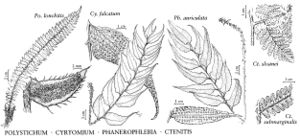Difference between revisions of "Ctenitis submarginalis"
Sunyatsenia 5: 250. 1940.
FNA>Volume Importer |
imported>Volume Importer |
||
| (One intermediate revision by the same user not shown) | |||
| Line 6: | Line 6: | ||
|place=5: 250. 1940 | |place=5: 250. 1940 | ||
|year=1940 | |year=1940 | ||
| + | }} | ||
| + | |special_status={{Treatment/ID/Special_status | ||
| + | |code=F | ||
| + | |label=Illustrated | ||
}} | }} | ||
|basionyms={{Treatment/ID/Basionym | |basionyms={{Treatment/ID/Basionym | ||
| Line 56: | Line 60: | ||
|publication title=Sunyatsenia | |publication title=Sunyatsenia | ||
|publication year=1940 | |publication year=1940 | ||
| − | |special status= | + | |special status=Illustrated |
| − | |source xml=https:// | + | |source xml=https://bitbucket.org/aafc-mbb/fna-data-curation/src/2e0870ddd59836b60bcf96646a41e87ea5a5943a/coarse_grained_fna_xml/V2/V2_607.xml |
|genus=Ctenitis | |genus=Ctenitis | ||
|species=Ctenitis submarginalis | |species=Ctenitis submarginalis | ||
Latest revision as of 20:24, 5 November 2020
Petiole scales brown, linear, 10–20 × 0.8–1.5 mm, lax, not densely tangled or woollike. Blade 1-pinnate-pinnatifid, glabrous or pubescent on both surfaces, glandular abaxially and occasionally adaxially, glands pale yellow, ca. 0.5 mm. Basal pinnae 8–18 × 2–3 cm, equilateral, incised more than 3/4 distance to costae. Ultimate segments 4–7 mm wide, margins ciliate. Veins 6–10(–15) pairs per segment, unbranched. Sori medial to supramedial; indusia present but soon deciduous or completely absent.
Habitat: Cypress swamps, hammocks, old forested spoil banks
Elevation: 0 m
Distribution

Fla., La., e, s Mexico, West Indies in Hispaniola, Central America, South America to Uruguay.
Discussion
Combining authorship of the accepted name sometimes has been incorrectly attributed to E. B. Copeland (1947). The Louisiana population of Ctenitis submarginalis occurs more than 960 km from populations in Florida and represents the northernmost locality for the species (G. P. Landry and W. D. Reese 1991). Unlike most ferns in North America, the plants in the Louisiana population are nonseasonal, producing leaves and sori throughout the year.
